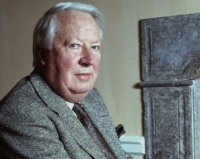Edward Heath
Edward Heath (9 July 1916-17 July 2005) was leader of the Conservative Party from 1965 to 1975 and Prime Minister from 1970 to 1974.[1]
Contents
Sex abuse allegations
Ten years after Sir Edward's death, allegations of child sexual abuse against him were received by eight police forces.[2]
Baron Armstrong of Ilminster, who as Robert Armstrong was PM Edward Heath's private secretary, said he had "never felt a whiff of sexuality about Ted Heath, whether it was in relation to women, men or children". On 14 August 2015, Lord Armstrong told Radio 4's Today Programme the allegations were "so totally uncharacteristic and unlikely" that he did not believe them to be true:
- "My incredulity is based on the way of life of a man and about his character and his personality.
- "When he was at home he had two policemen on the gate, he had the personal protection officer from Scotland Yard in the house, he never drove a car himself, he always had an official driver.
- "It just seems to me highly unlikely that he could have escaped all that to do the kind of thing that is described. I knew him for 35 years, I worked very closely with him while he was prime minister, and we remained friends for the rest of his life.
- "You usually detect some sense of sexuality when you are friends or work closely with them. I think he was completely asexual. There are some people like that and I think he was one of them."[3]
Bilderberg
As is not unusual for a Prime Minister of the United Kingdom, Heath attended the Bilderberg group before being elected leader of his political party (in 1963 and 1964).
Events Participated in
| Event | Start | End | Location(s) | Description |
|---|---|---|---|---|
| Bilderberg/1963 | 29 March 1963 | 31 March 1963 | France Cannes Hotel Martinez | The 12th Bilderberg meeting and the second one in France. |
| Bilderberg/1967 | 31 March 1967 | 2 April 1967 | United Kingdom St John's College (Cambridge) UK | Possibly the only Bilderberg meeting held in a university college rather than a hotel (St. John's College, Cambridge) |
| Bilderberg/1969 | 9 May 1969 | 11 May 1969 | Denmark Hotel Marienlyst Elsinore | The 18th Bilderberg meeting, with 85 participants |
| WEF/Annual Meeting/1980 | 1980 | 1980 | Switzerland | "The constantly changing world" |
Related Document
| Title | Type | Publication date | Author(s) | Description |
|---|---|---|---|---|
| Document:Tiny Rowland – portrait of the bastard as a rebel | Article | August 1990 | Nick Davies | All big entrepreneurs have the stink of unpopularity around them. Whether it is through envy or sincere distaste, Donald Trump, James Goldsmith, Rupert Murdoch, Robert Maxwell and Richard Branson have all become popular figures of hate. The one characteristic that has marked out Tiny Rowland is his lack of respect for authority. |
References
- ↑ Francis Boyd and Norman Shrapnel, Sir Edward Heath, The Guardian, 18 July 2005.
- ↑ "Police consider limited inquiry into Ted Heath child sex abuse claims"
- ↑ "Sir Edward Heath was completely asexual, says adviser"
